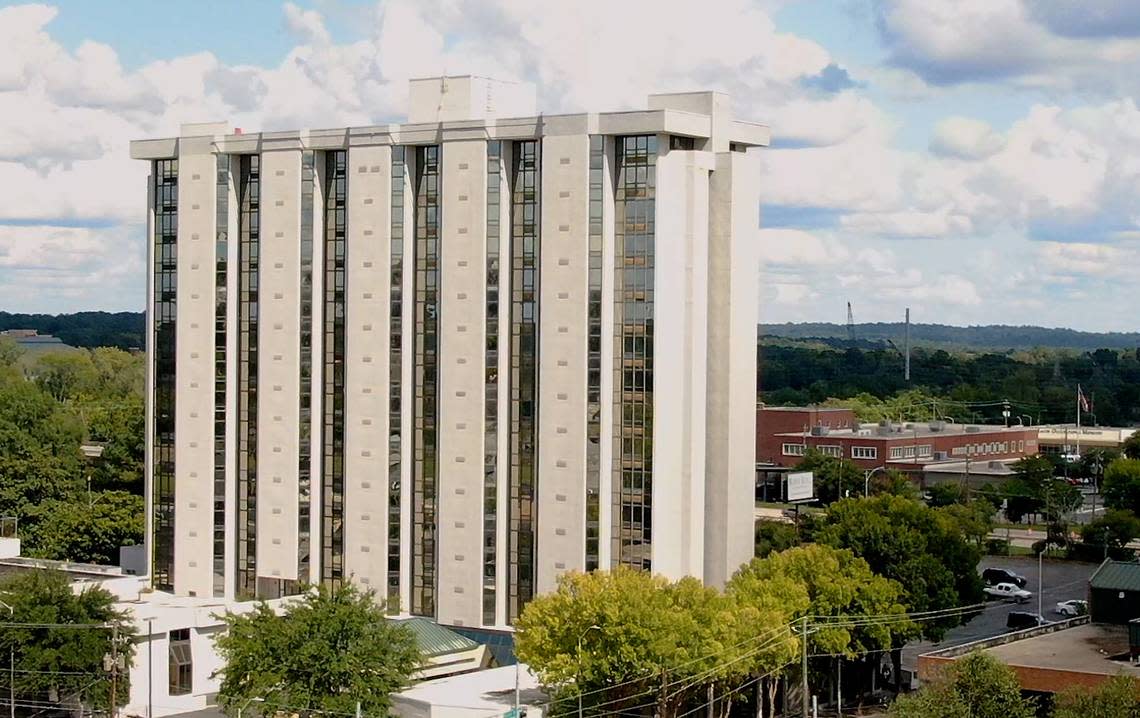Why could this Macon hotel be up for auction? The troubled past of the defunct Ramada
An iconic Macon hotel left vacant for nearly a decade may go up for auction in April, according to court documents from the hotel owner’s bankruptcy case.
Sangha Hospitality, the Ramada Plaza’s current owner Rupinder “Ruby” Sangha’s company, has until early April to sell the First Street highrise hotel to help pay their debts after filing for Chapter 11 bankruptcy about a year ago.
A judge signed off on the bankruptcy plan Jan. 3, which says that if the property isn’t sold within 90 days it will go up for auction to pay off Sangha’s debts, which include hundreds of thousands owed in county taxes and Macon Water Authority bills.
The 297-room structure has towered over Macon’s downtown skyline since its construction in the 1960s and was once a highlight of the city’s bid to attract tourists, but has routinely changed ownership since then and never managed to fill its rooms.
The 16-story building, which suffered fates ranging from leaky roofs to federal-scale bank fraud, has become a run-down husk of its former self and a symbol of an era that saw Macon’s downtown economy struggle to find an identity.

An unkind history
The hotel was announced in 1967 and opened in 1970 as a Hilton, but even in the years following the ribbon-cutting and tourism efforts it could not attract enough guests, according to Telegraph archives. The name changes and sales came shortly after.
A sale to a Baltimore company just two years later in 1972 ended in the Maryland-based investors going bust in 1978. A life insurance company that held a mortgage on the hotel took over, and an $8 million renovation ensued in the early 1980s.
Even after the hotel’s interior was refurbished, its owners struggled. It was sold again in 1989, this time to a North Carolina company called Zurich Corp., for less than half of what the insurance company invested.
Hilton stopped operating the hotel in April 1991, and it was renamed to the Macon Downtown Hotel. Later the same year, government officials seized the hotel and revealed that Zurich Corp. used the hotel to launder money in cahoots with Bank of Credit and Commerce International, The Telegraph reported in 1992.
The company earmarked millions of dollars for renovations that never happened, pocketing the cash instead.
From then on, the property spiraled. A Texas woman was murdered in a room in 1991, according to Telegraph archives. It was sold again to an Alabama company and became a Radisson franchise. The hotel struggled until it finally shut down in 2011.
Singha, a Canadian businessman, bought the hotel in 2013 for $3.1 million with visions of a grand renovation to turn the hotel into a Wyndham Ramada Plaza. He sunk another $5 million into the reworkings, but it was of little use.
The only people at the hotel after 2011 were live-in caretakers, who sued Singha in 2017 with claims they’d never been paid for their renovation work. The hotel was supposed to reopen in 2019 but the doors stayed shut. Singha tried to sell the hotel in 2021, then filed for bankruptcy last year.
What next?
With the judge’s ruling on the bankruptcy plan, the hotel’s future remains uncertain. Singha’s efforts to sell prior to the bankruptcy suit were unsuccessful, casting doubt on his ability to move the property ahead of the April deadline.
County commissioners expressed not just disinterest but opposition to the county acquiring or funding the property when Singha filed for bankruptcy last year, saying they “shouldn’t put up any money for it at all.”
Demolition is a possible option, perhaps the most viable one due to the consistent history of lackluster business.
Repurposing the building could be difficult. Chris Sheridan of Sheridan Construction, the company that renovated the building in the 1980s, told The Telegraph in 2012 that the building structure lends itself to lodging and little else.
